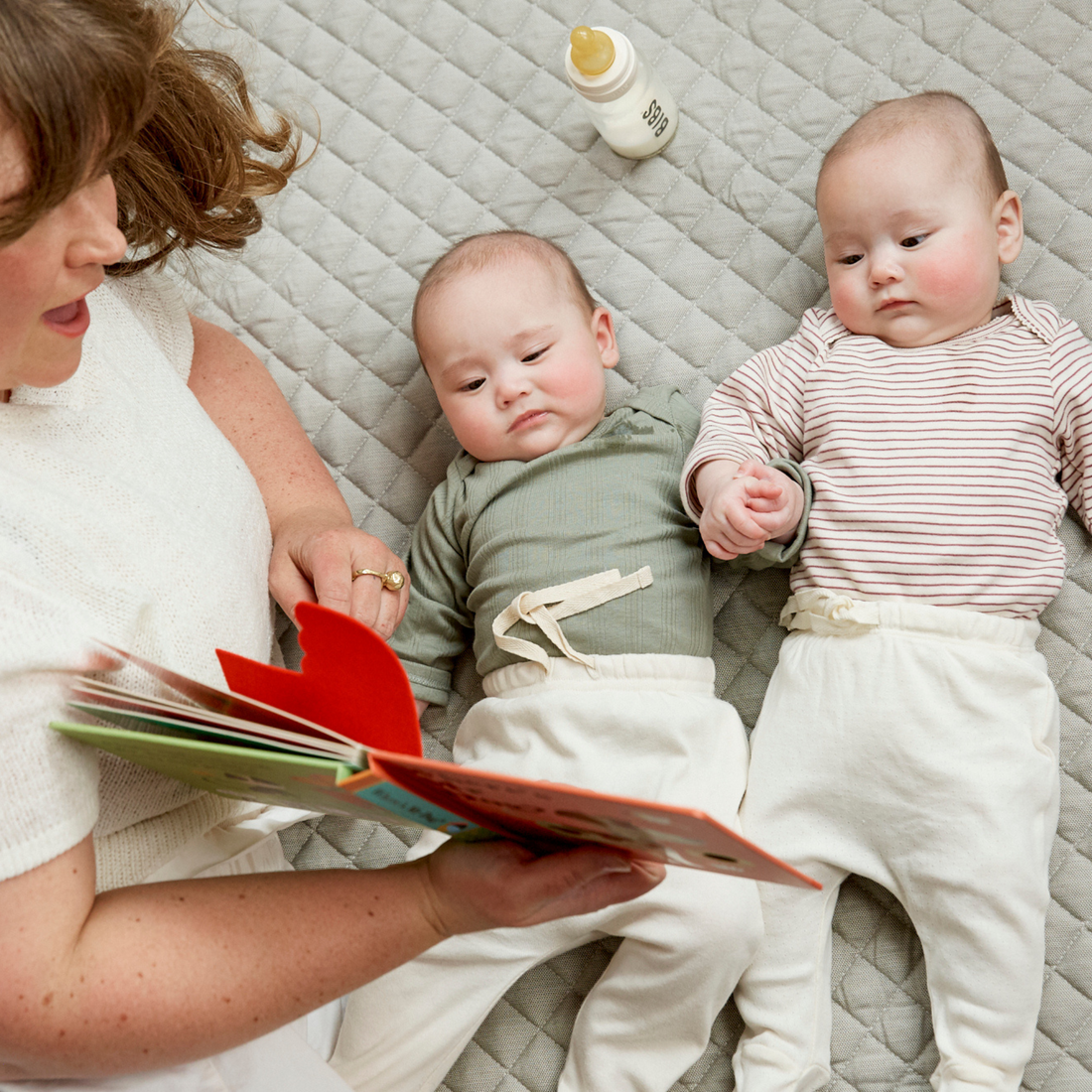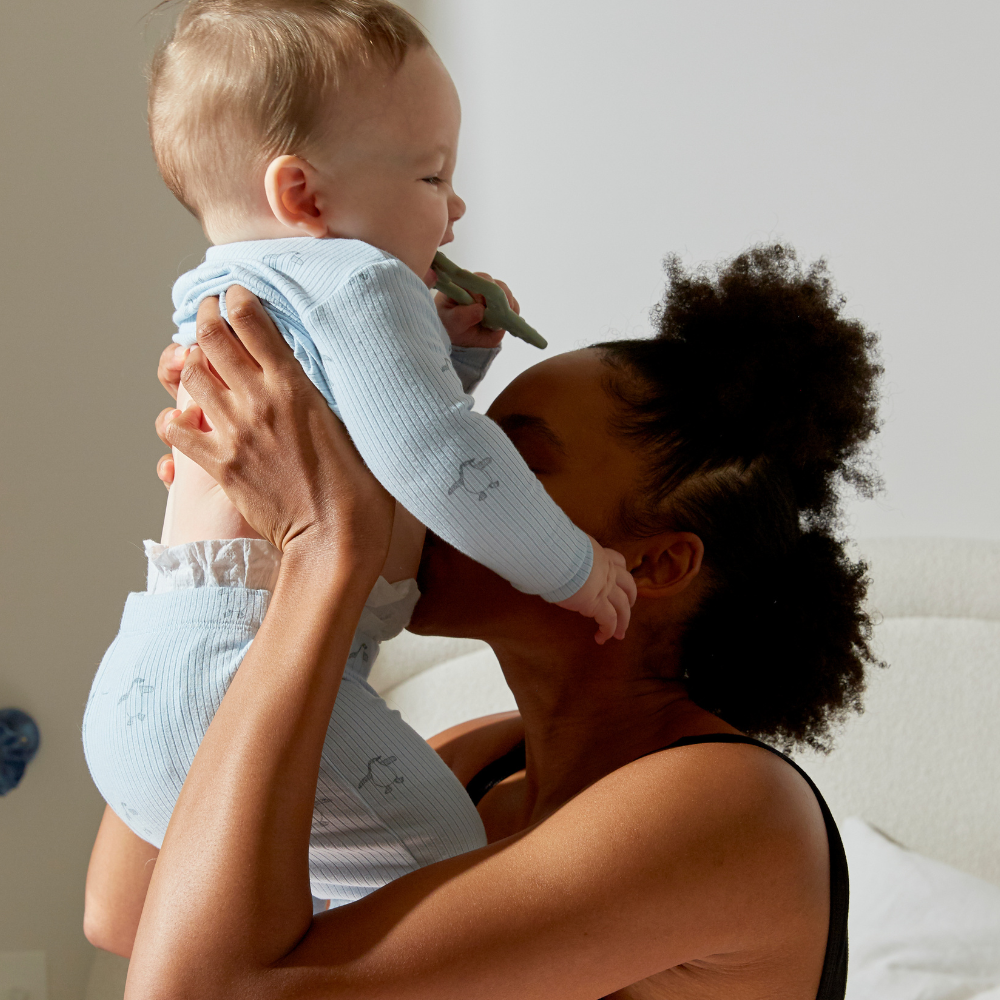As new parents, we’re told to talk and play with our babies to bond with them, but the how of these things isn’t always clear. You can’t exactly go have a round of tennis with them, or discuss the election… and for a lot of new parents, it’s been decades since they were around kids and back then, they were a kid. As a very social person who’s constantly chatting, it came naturally to sing and talk to my baby, but for my partner, someone much happier operating in silence, he found it difficult in the beginning. “What do I say?”
It was a valid point, he took me up on playing music and singing along (you don’t have to sing nursery rhymes) but he disregarded my suggestion of just narrating what he was doing (he said it made him feel like he was in a weird experiment), instead, he started with reading to our son. In a lot of ways, it was the prop that really fired-up their bond, which now, five-years-later is a consistent stream of questions, laughter and “bro!”
Giving you a starting point for baby play, is just one in a mighty long list of the benefits of reading to your baby. Even before they can hold a book, or say a word, reading to them is providing the building blocks for language and tools for forming lifelong social and emotional skills. More specifically it helps them develop:
- Literacy skills: Hearing words read aloud helps babies’ language skills develop. Reading over just conversation introduces them to a greater number of words and more complex language. One study found babies who were read to regularly starting at six months had a 40 percent increase in receptive vocabulary by the time they were 18 months old. Babies in the study who were not read to had only a 16 percent increase in receptive vocabulary.
- The parental bond: Your voice is your baby’s favourite thing to listen to, and sitting together signals safety, love and emotional connection. The one-on-one attention also nourishes your connection.
- Emotional learning: The pictures are great, but babies are getting even more from how your voice sounds when talking about something sad, or your smile at the happy ending. Seeing and then mimicking your expressions and the sounds you make helps with very early brain development. “Their brains are literally falling into sync,” says Professor Sam Wass, neuroscientist and director of the Institute for the Science of Early Years and Youth at the University of East London. The synapses of our brains fire at different frequencies all the time, depending on our physiology, age and the tasks we do. But Wass’s research has found that when parents and babies read together, their brainwaves synchronise, falling into the same patterns. “Everything falls into rhythm when you read to a child — your breathing rate, heartbeat and your brain rhythm,” he says.
- Establishing routines: You’ve heard it before, kids thrive on a routine. Introducing reading before bed is a great first routine and will become a sleep cue that might become a life-long habit. “Babies’ brains are messy," says Wass, "Their brain rhythms are naturally just all over the shop. Reading gives us increased regularity and predictability, both at the fine-grain scale in terms of language, but also because a child knows what is coming. It helps a baby’s rhythms to become more stable and more adultlike.”
- School readiness: Even though they are many years from arriving at the school gate, studies show about a third of kids start kindergarten without the language skills to learn how to read. Reading to babies and toddlers is the first step in helping them develop those necessary skills.
- Imagination: Reading to small children fires their imagination and curiosity as they learn about the world and the people in it. It also promotes their ability to focus and concentrate.
How to read to your baby
Firstly, there are no wrong ways to read aloud to your baby, and it’s never too early or too late to start. You don’t have to finish a book or read something new every day. Doing it often, for a few minutes at a time is beneficial as well as achievable for busy parents, and at a time when your baby is comfortable and happy. Here are some other story time tips.
- Cuddle together to help them feel secure and connected.
- Read with expression, use voices for the characters and ham it up. Yep, it’s showtime baby!
- Don’t worry about following the story to the word. If your baby wants to stop on a particular page and ask questions (or just stare at it), let them.
- Sing in the singing parts, roar when the lion roars and make it fun for them.
- Play it again, Sam! Yep, babies love, and also learn, from repetition, so read it, read it, then read it again.
- As your baby gets bigger encourage them to touch the book — sensory books are great for this as are books with flaps and tabs.
- When your baby starts responding to the book, stories that mirror aspects of their own lives are great. Books about bedtime, books about families, books about eating, books about going to school or their favourite things: dogs, trucks, the beach.
Finally, if you want to instil a love of books and reading in your child, one of the best things you can do is demonstrate your own love of reading. Remember to use your local library, and community book swaps to fill your home with books.
















